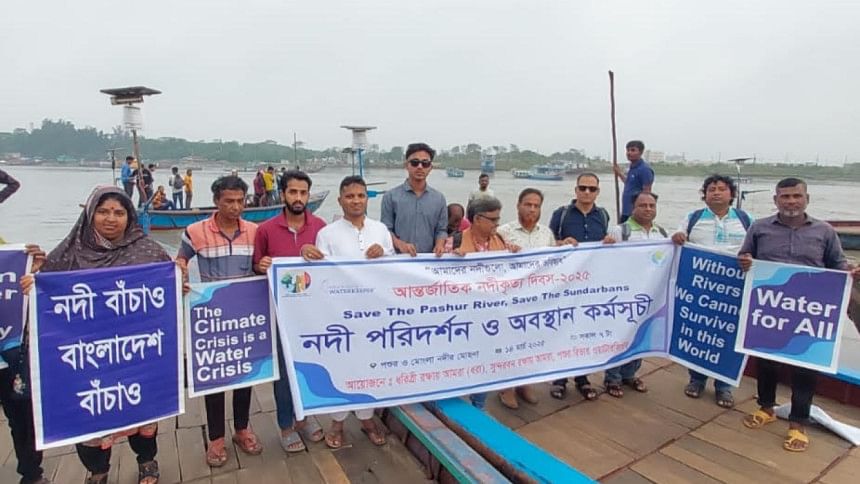37 rivers in Khulna division at risk: speakers

Relentless encroachment and pollution have placed 37 rivers in Khulna division in critical condition, warned speakers at an International Day of Action for Rivers event in Mongla yesterday.
They also mentioned that out of the 138 rivers in the division, 21 have completely lost their flow, while seven are only partially active.
The alarming situation was highlighted during a river inspection and protest programme at the confluence of the Mongla and Pashur rivers, organised by "Dharitri Rokkay Amra" (We for Earth), "Sundarban Rokkay Amra" (We for Sundarbans), and Pashur River Waterkeeper, under the slogan "Our Rivers, Our Future".
At the programme, Mongla Technical and Business Management College Principal Md Selim said, "Rivers are an integral part of our heritage and culture. The vast network of the Ganges, Brahmaputra, Meghna, Padma, Jamuna, Pashur, Rupsha, Surma, and Teesta forms the lifeline of Bangladesh. However, climate change, upstream water withdrawal, pollution, encroachment, unplanned development, and administrative negligence have pushed these rivers to the brink of extinction."
Women's rights activist Kamala Sarker expressed concerns over the environmental hazards caused by the Rampal Power Plant.
She said, "Pollution from the Rampal Power Plant has led to the presence of toxic substances in fish from the Sundarbans' rivers, posing a serious threat to human health. It is high time we shut down this environmentally destructive project".
Meanwhile, environmental activist Mostafizur Rahman Milon, lyricist Mollah Al Mamun, and river activists Idris Imon and Hasib Sardar addressed the gathering, urging immediate action to protect the country's rivers. Volunteer members of the Pashur River Waterkeeper, including Dollar Mollah and Mehedi Hasan, actively participated in the discussions.
Mohammad Noor Alam Sheikh, coordinator of 'Sundarban Rokkay Amra' and Pashur River Waterkeeper, warned that industrial, plastic, and agricultural waste are exacerbating river pollution.
He also said, "Climate change is another major threat to our rivers. Rising sea levels and increased salinity are making the water in coastal rivers unfit for use, aggravating both agricultural challenges and the drinking water crisis".
He further highlighted the impact of reduced Ganges water flow and climate change on the Sundarbans by adding, "The rising salinity levels in the Sundarbans' rivers are accelerating the destruction of the mangrove forest, putting its unique ecosystem at serious risk."
Speakers at the event unanimously urged the authorities to take immediate action to protect the country's rivers from further destruction. They warned that without urgent intervention, Bangladesh's rivers, which are vital for biodiversity, livelihoods, and agriculture will continue to degrade, posing a serious threat to both people and nature.

 For all latest news, follow The Daily Star's Google News channel.
For all latest news, follow The Daily Star's Google News channel. 



Comments